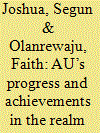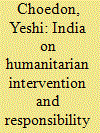|
|
|
Sort Order |
|
|
|
Items / Page
|
|
|
|
|
|
|
| Srl | Item |
| 1 |
ID:
156974


|
|
|
|
|
| Summary/Abstract |
When Organisation of African Unity (OAU) was formed, the problem confronting Africa continent then was colonialism. It is therefore not a surprise that its major preoccupation was how to liberate countries within the continent that were still under the grip of colonialism. However, the surge of conflicts in various African countries shortly after independence, manifesting in form of ethnicity, religious, struggle for political power among others, coupled with OAU policy of non-intervention in the domestic affairs of member states, combined to turn African continent to the bedlam of the world. The failure of OAU led to the formation of the African Unity (AU) to correct some of these ills. This article examines AU’s achievements in the realm of peace and security using secondary sources of data gathering. Since AU came on board, how far has it fared in promoting peace and security in the continent? Findings reveal that although AU has achieved much in the realm of peace and security in Africa, yet it lacks the needed human resources and institutional capacity to conduct effective peace operations and peace-making initiatives. The study therefore suggested among others the need to strengthen AU’s institutional capacity and more personnel should be donated by members countries
|
|
|
|
|
|
|
|
|
|
|
|
|
|
|
|
| 2 |
ID:
156973


|
|
|
|
|
| Summary/Abstract |
India’s opposition to humanitarian intervention has been influenced by its colonial experience and its predisposition towards the principles of sovereignty and non-intervention. However, India did not adopt a strident opposition in the post-Cold War due to the changed power configuration. The article discusses how India adopted a cautious approach and yet used every opportunity to remind the international community the baleful effect of intervention in the internal affairs. After securing concession to a considerable extent on the ambitious Responsibility to Protect (R2P) and when most of the countries showed an inclination to accept humanitarian intervention in the form of ‘R2P’ at the UN summit in 2005, India grudgingly went along accepting it. India participated in the deliberation on the implementation of R2P and took its stand on various crises in which R2P was evoked. The experience of NATO’s Libya operation under R2P was regarded as substantiation of India’s apprehension of the misuse of the concept, and India reverted its position to the sceptical view of humanitarian intervention/R2P. By mere complaining about the mixing of peace enforcement with peacekeeping, when the United Nations deployed ‘intervention brigade’ for the protection of civilians, India lost the opportunity to take the initiative to propose a new mechanism to deal with the humanitarian crisis in atrocious internal conflicts.
|
|
|
|
|
|
|
|
|
|
|
|
|
|
|
|
| 3 |
ID:
156972


|
|
|
|
|
| Summary/Abstract |
Growing media attention and international criticism about human rights violations in the wake of the resurgence of insurgency led India to make major policy changes in its attitude towards human rights and begin to discuss human rights with the European Union for the first time in 1990. This article critically examines Indian perceptions of the EU’s approach towards human rights since the 1990s to the present. It evaluates Indian responses to the inclusion of human rights provisions in trade agreements and criticism of the ‘one size fits all’ model of the Europeans for the promotion of human rights. It explores the sources of Indian scepticism about the international human rights regime and criticism of Western countries’ selectivity in enforcing human rights. In the ultimate analysis, the responsibility for initiating and implementing the multitude of structural, economic, social and political reforms necessary to improve human rights implementation must be taken by Indians themselves. External players can only play a supportive role and their capacities to bring about fundamental change are necessarily limited.
|
|
|
|
|
|
|
|
|
|
|
|
|
|
|
|
| 4 |
ID:
156970


|
|
|
|
|
| Summary/Abstract |
Globalisation and market reforms have made foreign policymaking a more inclusive and multilayered process. Para-diplomacy and emergence of empowered federating/component units engaging in international interaction call for recalibration of theories and understating of International Relations. The debate over central control versus unit autonomy raised the concern: whether para-diplomacy will turn out to be an asset or a threat for the sovereign state. While state may reap benefits of economic development, para-diplomacy may yet lead to regional imbalance, ethnic mobilisation and separatism. With the focus being shifted to Asia with respect to expanding market and sphere of influence, this article analyses the experience of para-diplomacy between India and China as well as of both with the USA. In doing so, reference is drawn to the past experiences of the West to understand how para-diplomacy took root and how is it practised in different contexts. Considering the economic, political and social implications of para-diplomatic practices in specific contexts, the article concludes with an attempt to find out the institutional space it may tread and the policy options it may hold out especially for India.
|
|
|
|
|
|
|
|
|
|
|
|
|
|
|
|
| 5 |
ID:
156971


|
|
|
|
|
| Summary/Abstract |
Cultural and civilisational stratum of existence of South and Central Asian regions and separate states associated with the numerous manifestations of identity (ethnic, confessional, linguistic, etc.) appears an important component of their political, social and economic being at the internal and external levels. At the same time, in the countries of these two regions, there are elements of both similarities and differences in the identity-related sphere that allows performing a look-through comparative-contrasting analysis of their complexes of identities on the basis of correspondence/incongruity to various theories, as well as of actual practice of their materialisation. In this regard, it is viable to discuss issues such as the identity theories in applications to the realities of South and Central Asia, the exposure on and specifics of implementation/non-implementation of the conflict potential of identities in both regions and the transfiguration of identities under the influence of mutual migrations. Immediate positive experience and best practises of implementing the identity policy in the two regions with particular emphasis upon India and Kazakhstan also deserve special attention.
|
|
|
|
|
|
|
|
|
|
|
|
|
|
|
|
|
|
|
|
|